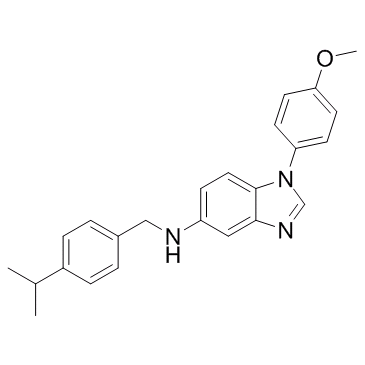ST-193 hydrochlorid
Modify Date: 2024-01-17 09:12:53

ST-193 hydrochlorid structure
|
Common Name | ST-193 hydrochlorid | ||
|---|---|---|---|---|
| CAS Number | 489416-12-8 | Molecular Weight | 371.475 | |
| Density | 1.1±0.1 g/cm3 | Boiling Point | 562.5±60.0 °C at 760 mmHg | |
| Molecular Formula | C24H25N3O | Melting Point | N/A | |
| MSDS | N/A | Flash Point | 294.0±32.9 °C | |
Use of ST-193 hydrochloridST-193 is a potent broad-spectrum arenavirus inhibitor; inhibits Guanarito, Junin, Lassa and Machupo virus with IC50 values of 0.44, 0.62, 1.4 and 3.1 nM, respectively. |
| Name | ST-193 |
|---|---|
| Synonym | More Synonyms |
| Description | ST-193 is a potent broad-spectrum arenavirus inhibitor; inhibits Guanarito, Junin, Lassa and Machupo virus with IC50 values of 0.44, 0.62, 1.4 and 3.1 nM, respectively. |
|---|---|
| Related Catalog | |
| Target |
IC50: 0.44 nM (Guanarito), 0.62 nM (Junin), 1.4 nM (Lassa) and 3.1 nM (Machupo)[1] |
| In Vitro | ST-193 inhibits LASV pseudotypes with an IC50 of 1.6 nM. ST-193 inhibits pseudotypes generated with other arenavirus envelopes as well, including the remaining four commonly associated with hemorrhagic fever (IC50s for Junín, Machupo, Guanarito, and Sabiá were in the 0.2 to 12 nM range) but exhibits no antiviral activity against pseudotypes incorporating either the GP from the LASV-related arenavirus lymphocytic choriomeningitis virus or the unrelated G protein from vesicular stomatitis virus, at concentrations of up to 10 μM[2]. |
| In Vivo | ST-193 is found to be tolerated well when administered daily as an intraperitoneal injection of either 25 or 100 mg/kg/day for 14 days. ST-193-treated animals exhibit fewer signs of disease and enhance survival when compared to the ribavirin or vehicle groups. Body temperatures in all groups are elevated by day 9, but returned to normal by day 19 postinfection in the majority of ST-193-treated animals. ST-193 treatment mediates a 2- to 3-log reduction in viremia relative to vehicle-treated controls. The overall survival rate for the ST-193-treated guinea pigs is 62.5% (10/16) compared with 0% in the ribavirin (0/8) and vehicle (0/7) groups[3]. |
| Animal Admin | Guinea pigs: ST-193 is formulated as a solution in 32% (w/v) 2-hydroxypropyl-β-cyclodextrin (HP-β-CD). Female Hartley guinea pigs are injected intraperitoneally with a 10 mg/mL solution of ST-193 at a volume of either 2.5 mL per kg of body weight (25 mg/kg) or 10 mL per kg (100 mg/kg). Four animals per dose are used, with blood samples collected from two animals per dose at each time point in alternating fashion. Blood samples are obtained at the indicated time points (4-24 h)[3]. |
| References |
| Density | 1.1±0.1 g/cm3 |
|---|---|
| Boiling Point | 562.5±60.0 °C at 760 mmHg |
| Molecular Formula | C24H25N3O |
| Molecular Weight | 371.475 |
| Flash Point | 294.0±32.9 °C |
| Exact Mass | 371.199768 |
| LogP | 5.80 |
| Vapour Pressure | 0.0±1.5 mmHg at 25°C |
| Index of Refraction | 1.609 |
| Storage condition | 2-8℃ |
| 1H-Benzimidazol-5-amine, 1-(4-methoxyphenyl)-N-[[4-(1-methylethyl)phenyl]methyl]- |
| N-(4-Isopropylbenzyl)-1-(4-methoxyphenyl)-1H-benzimidazol-5-amine |